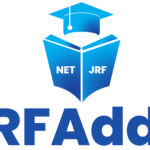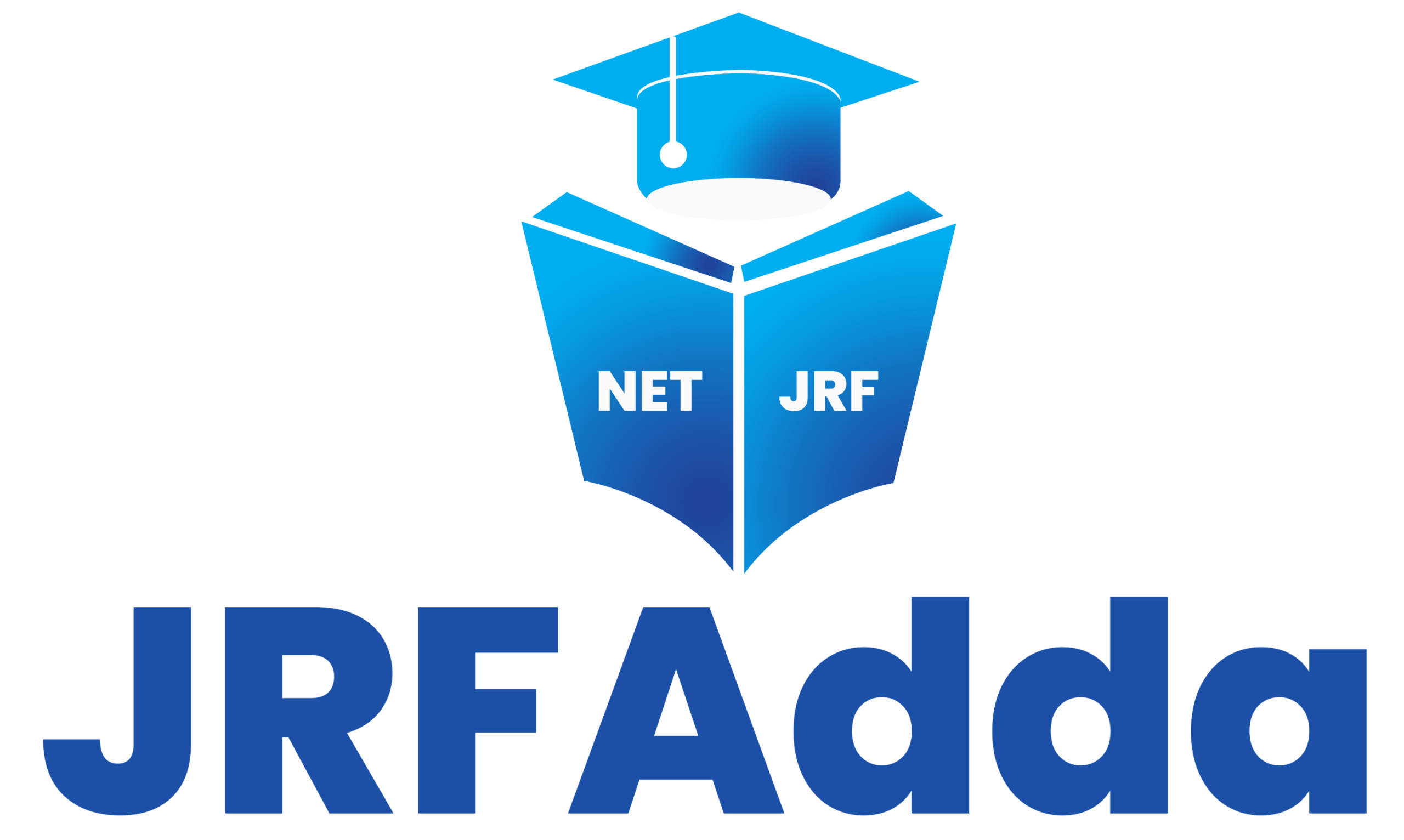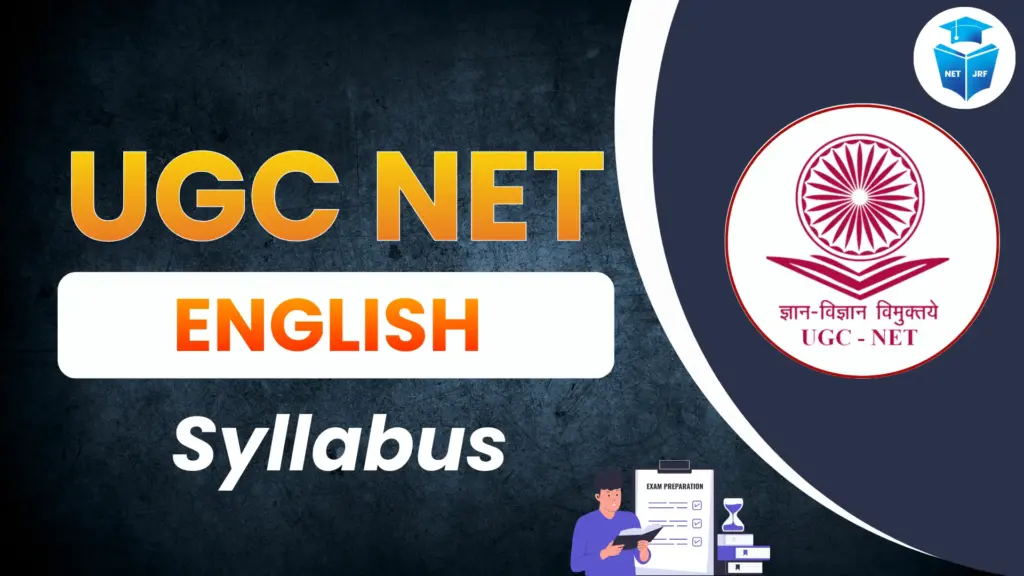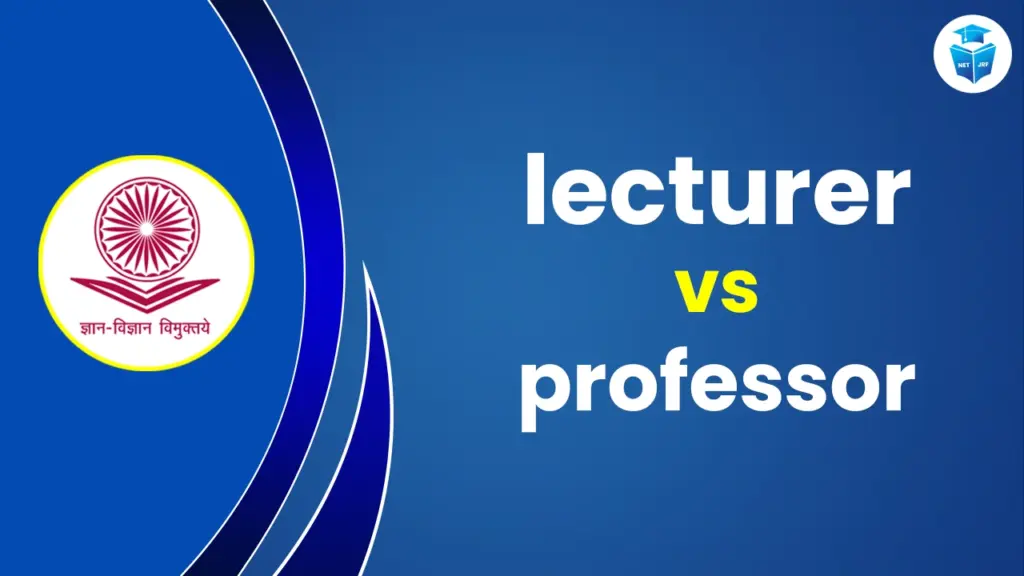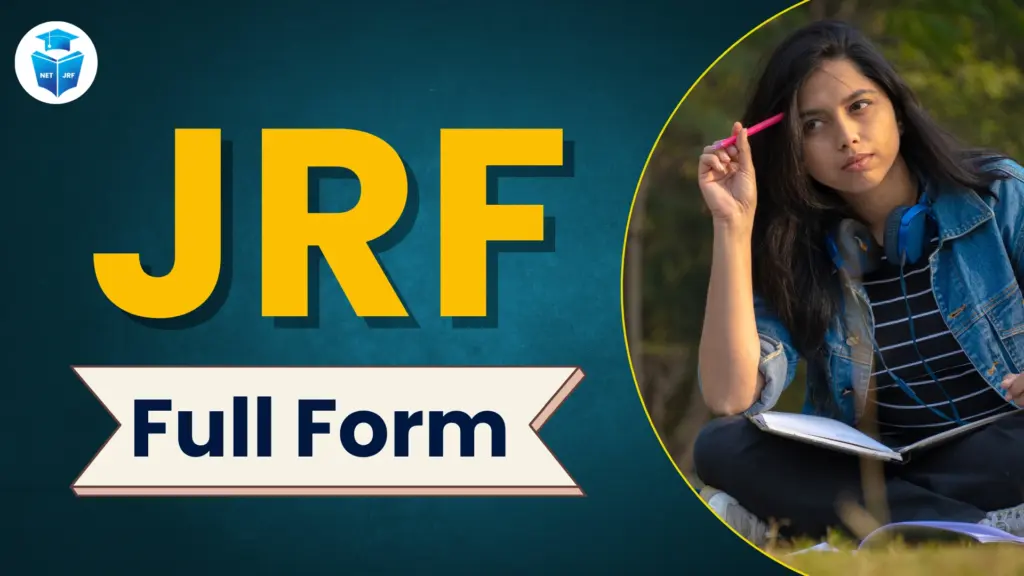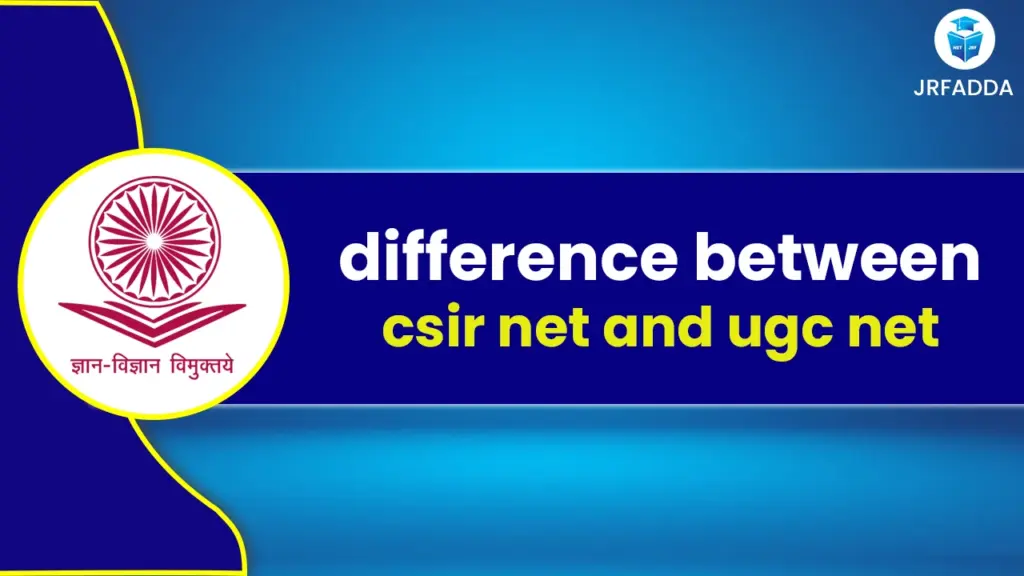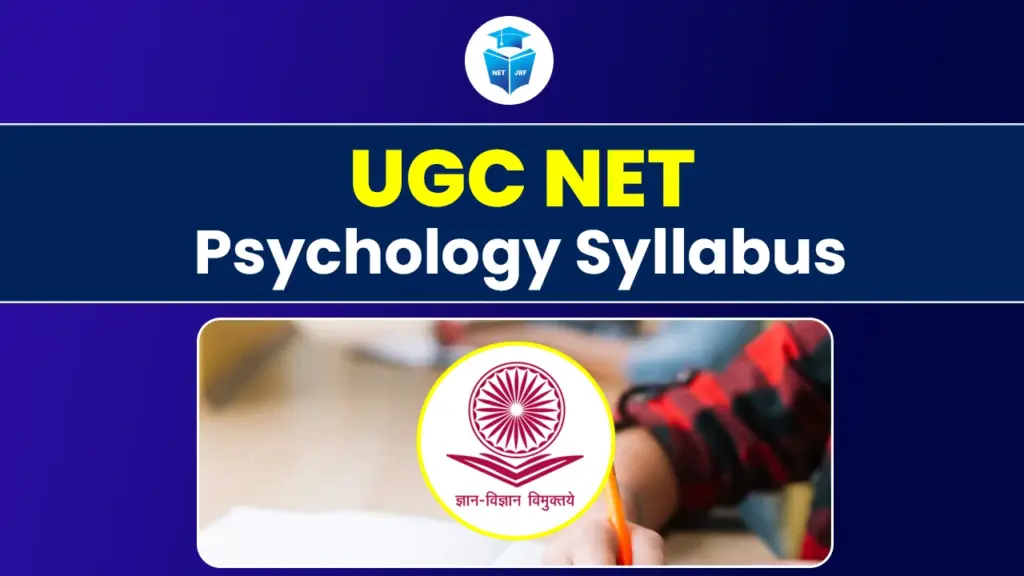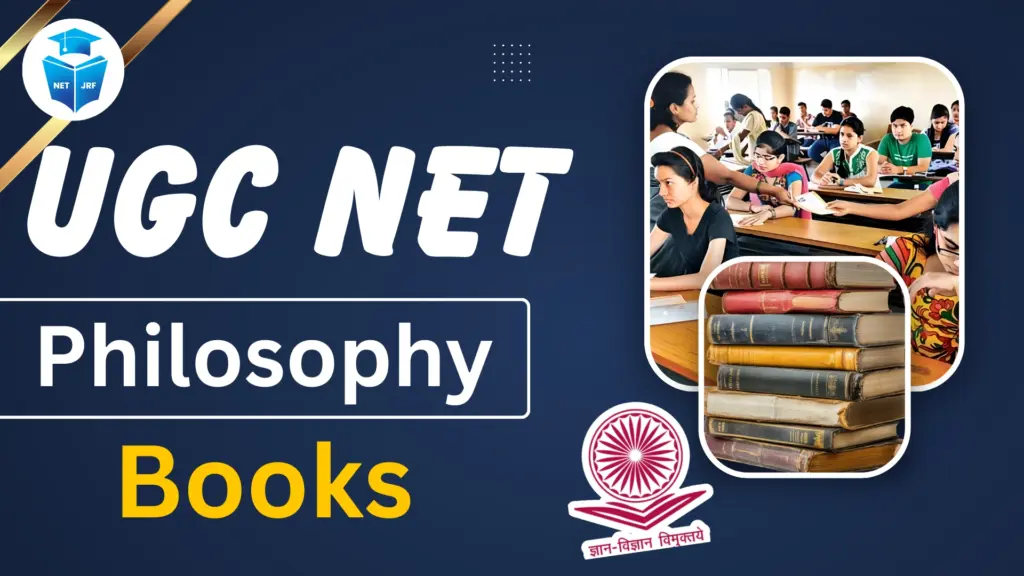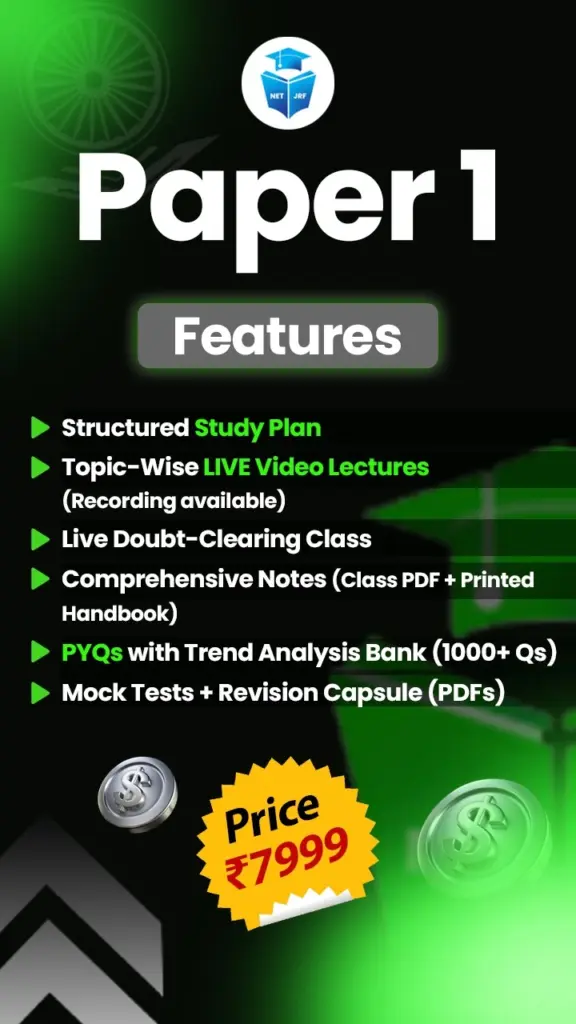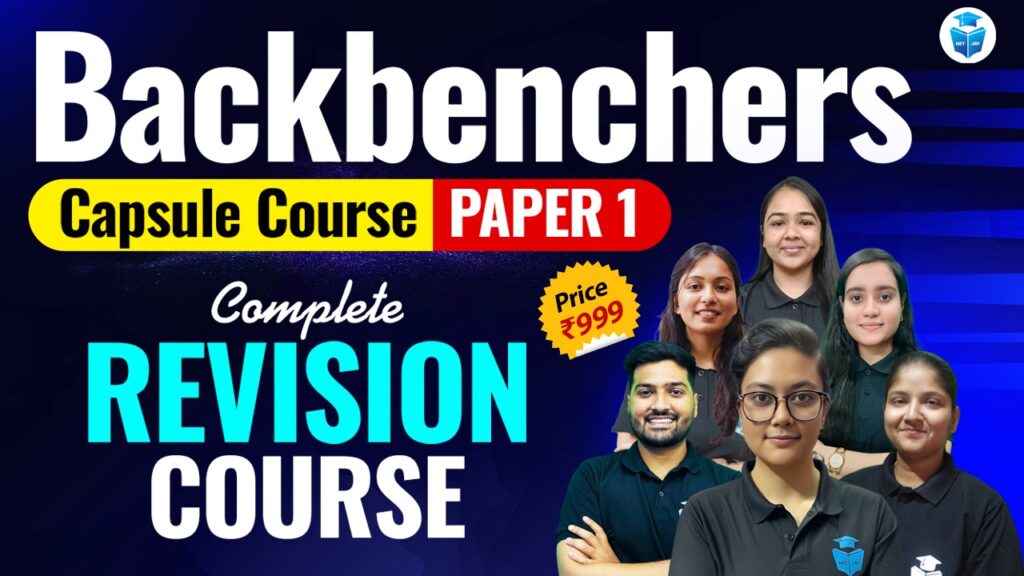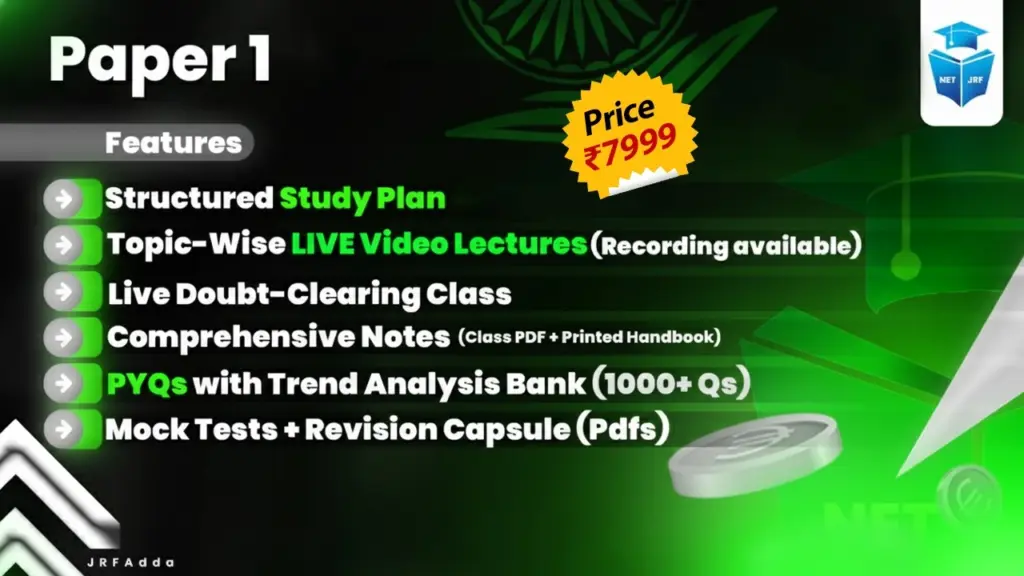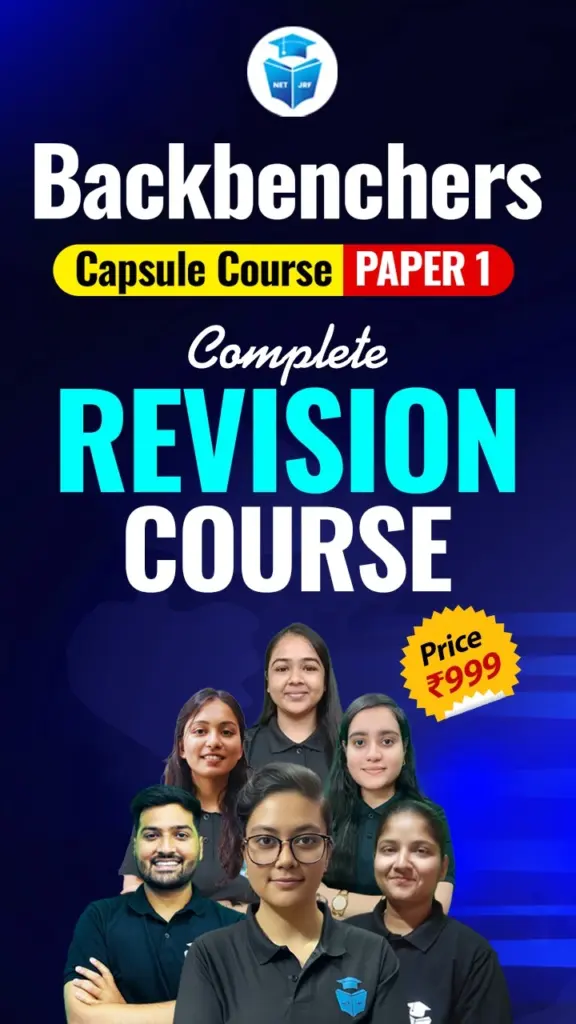UGC NET English Syllabus 2026 is important for the aspirants preparing for the June 2026 session. The aspirants need to thoroughly understand the complete UGC NET English Syllabus 2026 in order to plan an effective preparation strategy and focus on the most important topics. The UGC NET exam 2026 conducts two papers: Paper 1 (General Aptitude) and Paper 2 (Subject-specific, i.e., English) to evaluate the candidates’ eligibility for Assistant Professor and Junior Research Fellowship (JRF) positions in various universities and colleges across India.
Also Read: UGC NET Exam 2026
JRFAdda Premium June 2026 English Batch Paper 2- Join Today!
UGC NET English Syllabus 2026 Overview
The UGC NET exam is conducted by the National Testing Agency (NTA) to assess candidates’ eligibility for the roles of Assistant Professor and Junior Research Fellowship (JRF) in English. The UGC NET exam consists of two papers: Paper 1 for General Aptitude and Paper 2 for Subject-Specific: English Literature. The UGC NET exam is conducted in a single session of 3 hours.
The UGC NET English syllabus 2026 is designed to evaluate a candidate’s comprehensive understanding of English literature, criticism, theory, and linguistic aspects. Understanding the UGC NET syllabus 2026 in detail helps aspirants to prioritize the important areas, streamline their preparations and use relevant study resources.
| Exam | Details |
| Name | UGC NET 2026 |
| Conducting Body | National Testing Agency (NTA) |
| Purpose | Eligibility for Assistant Professor & Junior Research Fellowship (JRF) |
| Frequency of Exam | Twice a year |
| Exam Mode | Online Computer-Based Test (CBT) |
| Number of Papers | Paper 1 and Paper 2 |
| Total Number of Questions | Paper 1- 50 questions Paper 2- 100 questions |
| Total Marks | 300 marks (Paper 1- 100 marks, Paper 2- 200 marks) |
| Subject Code for English | 30 |
| Expected Exam Date | 25 June to 29 June 2026 (Tentative) |
| Official Website | https://ugcnet.nta.nic.in/ |
Enroll Now- UGC NET English Course June 2026
UGC NET English Syllabus 2026 PDF Download
Aspirants preparing for the UGC NET English 2026 exam, it is important to thoroughly understand the official syllabus released by the National Testing Agency. Candidates can download the UGC NET English Syllabus 2026 PDF from the link below, as it serves as an important guide for focused and strategic preparation. The UGC NET English syllabus 2026 mentions all the key areas that candidates must master, and accessing the syllabus early ensures that your study efforts remain aligned with the exam’s expectations, minimizing the risk of overlooking important content. Aspirants must review the syllabus regularly to enhance their preparation plan and help track progress efficiently.
Download UGC NET English Syllabus 2026 PDF
UGC NET Syllabus Paper 1 PDF Download
UGC NET Paper I is a general paper designed to evaluate the teaching and research aptitude of all UGC NET aspirants, regardless of their chosen subject, including English. The UGC NET Paper 1 evaluates core competencies such as comprehension, communication, reasoning ability, and analytical skills—essential for academic and research roles. This exam is common for all the subjects, and candidates must thoroughly understand the official UGC NET English Syllabus 2026 provided by the National Testing Agency (NTA). The clear grasp of all these foundational topics helps to boost performance in exams and also strengthens essential skills required for a successful career in teaching and research.
UGC NET English Syllabus 2026 Breakdown
To understand the comprehensive topic-wise UGC NET English Syllabus 2026 is important for aspirants to have focused and effective preparation. The UGC NET English Syllabus 2026 is divided into ten major units, covering key areas of English literature, literary criticism, theory, language, and pedagogy. Candidates who approach each unit methodically are better positioned to identify high-priority topics, allocate study time efficiently, and ensure complete UGC NET English Syllabus 2026 coverage. This structured understanding also helps aspirants to align their preparation with the exam’s pattern and recurring question trends, ultimately enhancing performance.
JRFAdda Gold June 2026 English Batch (Paper1+Paper2)- Join Today!
UGC NET English Paper 1 Syllabus 2026 Topic Wise
The UGC NET Paper 1 exam is common for all aspirants and evaluates general skills such as teaching aptitude, research methodology, logical reasoning, and communication. Whereas UGC NET Paper 2 focuses on subject-specific expertise like English Literature, Paper 1 plays an important role in boosting overall score and is equally important for qualifying for Assistant Professor or Junior Research Fellowship (JRF) positions. Below, we have mentioned the UGC NET Paper 1 Syllabus 2026 in a detailed, topic-by-topic format.
| Unit | Topics |
| Unit 1: Teaching Aptitude | Nature and objectives of teaching, Learner characteristics, Factors affecting teaching, Teaching methods and techniques, Teaching aids and evaluation systems |
| Unit 2: Research Aptitude | Research characteristics and types, Methods of research (qualitative & quantitative), Steps of research, Thesis and article writing, Research ethics and paper format |
| Unit 3: Reading Comprehension | A passage followed by questions to assess: Interpretation, Vocabulary, Critical understanding |
| Unit 4: Communication | Basics of communication: types, characteristics, Verbal and non-verbal communication, Barriers to effective communication, Classroom communication |
| Unit 5: Mathematical Reasoning and Aptitude | Number series, letter series, codes, Relationships and puzzles, Ratio, percentage, profit & loss, Averages and time-based problems |
| Unit 6: Logical Reasoning | Analogies, syllogism, Venn diagrams, Deductive and inductive reasoning, Arguments and assumptions, Structure of arguments |
| Unit 7: Data Interpretation | Data tables, charts, and graphs, Data analysis and interpretation, Percentages and ratios related to data |
| Unit 8: Information and Communication Technology (ICT) | Basics of computers and the internet, Digital initiatives in higher education, ICT tools and applications, E-learning and computer literacy |
| Unit 9: People, Development and Environment | Environmental issues and sustainable development, Natural resources and biodiversity, Environmental policies and education, Human and environmental interaction |
| Unit 10: Higher Education System | Structure and governance of higher education in India, Historical development, Policies, bodies (UGC, AICTE, NAAC, etc.), Value and ethics in higher education |
Also Read: UGC NET Syllabus 2026
UGC NET English Paper 2 Syllabus 2026 Topic Wise
Paper 2 of the UGC NET English exam evaluates a candidate’s subject-specific knowledge in English Literature. The UGC NET English Syllabus 2026 spans a broad range of literary periods, genres, critical theories, and linguistic aspects. Below is the unit-wise breakdown of the Paper 2 UGC NET English Syllabus 2026 to guide focused preparation:
| Unit | Topics |
| Unit 1: Drama | Origins and development of drama
Greek, Elizabethan, Jacobean, Modern drama Indian English drama Important dramatists: Shakespeare, Ibsen, Beckett, Girish Karnad, etc. Theatrical movements and performance theory |
| Unit 2: Poetry | Historical development of poetry from Chaucer to contemporary poets
British, American, Indian, and postcolonial poets Forms: sonnet, ode, elegy, ballad, free verse Poets: Milton, Wordsworth, Whitman, Eliot, Kamala Das, etc. |
| Unit 3: Fiction, Short Story, and Novel | Rise and evolution of the novel and short story
Major novelists and short story writers from British, American, Indian, and world literature Genres: Gothic, Realism, Postmodern, Magic Realism Authors: Austen, Dickens, Joyce, Toni Morrison, Arundhati Roy, etc. |
| Unit 4: Non-Fictional Prose | Essays, memoirs, travelogues, biographies
Key prose writers and thinkers: Bacon, Orwell, Nehru, Ambedkar, etc. Development of non-fictional prose in various literary traditions |
| Unit 5: Literary Criticism | Classical criticism: Plato, Aristotle, Longinus
Neoclassical and Romantic criticism Modern criticism: Formalism, New Criticism, Reader-Response, Structuralism, etc. Indian aesthetics and theories of Rasa and Dhvani |
| Unit 6: Literary Theory | Poststructuralism, Postcolonialism, Feminism, Marxism, Psychoanalysis, Eco-criticism, Queer theory, Cultural Studies
Theorists: Foucault, Derrida, Said, Spivak, Judith Butler, etc. |
| Unit 7: English Language: History and Structure | Origin and development of English
Phonetics and phonology Morphology, syntax, semantics Varieties of English |
| Unit 8: English in India: History, Evolution, and Futures | English education during British rule
English in post-independence India Debates on English vs regional languages Policies and teaching methods |
| Unit 9: Cultural Studies | Concepts: Ideology, Discourse, Hegemony, Popular Culture, Globalization
Intersections with race, gender, class, and identity Media, cinema, digital culture |
| Unit 10: Research Methods and Materials in English | Types of research in literature and language
MLA, APA citation styles Using digital resources and research databases Plagiarism and ethical research practices |
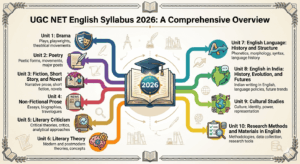
JRFAdda Silver June 2026 English Batch (Paper1+Paper2)- Join Today!
UGC NET English Exam Pattern 2026
The UGC NET English exam comprises two papers conducted in a single session without any break. Both papers consist of multiple-choice questions (MCQs) and are administered in Computer-Based Test (CBT) mode. Both Paper 1 and Paper 2 of the UGC NET exam for English have different goals and cover different topics. There will be +2 marks for each correct answer; no negative marking for incorrect answers.
| Papers | No. of Questions | Marks | Type of Questions |
| Paper 1 | 50 | 100 | General Aptitude |
| Paper 2 | 100 | 200 | Subject-specific (English) |
Also Read: UGC NET Exam Pattern 2026
Conclusion
Aspirants preparing for the UGC NET English Exam 2026 require a thorough understanding of both the Paper 1 and Paper 2 syllabi. The Paper 1 evaluates essential teaching and research skills, while Paper 2 demands subject-specific expertise in English Literature, theory, criticism, and language. Having a thorough understanding of the official UGC NET English Syllabus 2026 helps candidates to prioritize the important topics, manage time efficiently, and boost overall confidence.
Aspirants should download the official UGC NET English Syllabus 2026 PDFs, follow the topic-wise breakdown, and regularly revise to stay on track. A smart, well-informed approach will significantly improve your chances of qualifying for Assistant Professor or Junior Research Fellowship (JRF) under the UGC NET.
UGC NET English Syllabus 2026 FAQs
How do I download the official UGC NET English Syllabus 2025 PDF?
The official UGC NET English Syllabus 2025 PDF is downloadable from the National Testing Agency (NTA) website. Download links are also mentioned above in this article.
What topics are covered in UGC NET English Paper 2?
Paper 2 covers topics such as English Literature (Drama, Poetry, Fiction), Literary Criticism, Theory, Linguistics, Cultural Studies, and Research Methods.
How should I use the UGC NET English syllabus for preparation?
Use the syllabus to create a study plan, focus on topic-wise revision, and prioritize important units. Regularly refer back to it to ensure full coverage.
What is the duration of the UGC NET English exam?
The total duration of the UGC NET English exam (Paper 1 + Paper 2) is 3 hours (180 minutes) in a single session.
Are there any changes in the UGC NET English syllabus for 2025?
As of now, no major changes have been officially announced. However, candidates should always refer to the latest syllabus on the official NTA website for updates.
